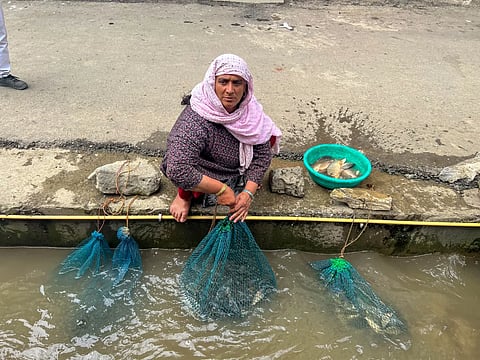

Gowher Bhat
Bundled up in warm shawls, much before the sun begins to peek over the mountains, Srinagar’s fisherwomen make their way to the banks of Dal Lake or Jhelum River. Some row their own boats, their hands used to the oars, the water still and dark around them. Others wait on the shore, watching for the boats to come in, ready to start bargaining for the day’s catch.
That’s how every day starts for them. That’s been the routine for decades.
After spending their early mornings in the often-frigid cold waters, their afternoons see them with heavy loads of baskets filled with fish, their bodies and clothes carrying the stale stink of fishes, they walk to their daily spot in the marketplace to set up their make-shift shops where they arrange their fish neatly and await for their customers.
While some go out to fish on their own. Others wait for their male counterparts to provide them with a basket full of goodies which can then be put up for sale.
Beyond Srinagar, in many other parts of the Valley, it is women who are involved in the fish selling trade. What keeps them going is a long tradition.
As Zaina, a fisherwoman from Anchar lake, says, “This is in our blood. Our moms did this, and now we do it. We have to work, no matter what.”
Like the precision of a jeweller scrutinizing his gems, she can tell by the look of a fish whether it is fresh enough. “Over the years, you learn, what will sell and what won’t,” she says but adds, “despite the knowledge, sometimes were return back with unsold fish or very little money.”
What adds to their worries is that polluting water bodies and climate changes are impacting the aquatic life. Fish is a difficult catch because there are much lesser fishes and fishes of good quality are fast disappearing. Even their basket loads when they move towards the market are less heavy.
Many fisherwomen are now looking at alternatives like procuring fish transported from Jammu and Punjab for sustenance. But they still worry about a future that is not only threatened by decreasing fish but also by their working conditions – unsafe boats, lack of cold storage facility and dirty roads, where they spend all day and no market regulations or government schemes to support them.
There’s no place to keep the fish cool. They need to sell it fast, or it goes bad. And if it does, they lose the money. Shaheena, who sells near Nishat, remembers a really hot day. “The sun was so strong that half my fish was rotting by noon. I had to throw it away. That was half my money for the day, gone just like that,” she recalls.
Sometimes, shopkeepers around them tell them to move because of the smell and waste of fish. People complain about the smell too. But the fisherwomen have nowhere else to go. They continue their tradition as it passes from generation to generation.
The girls watch their moms and learn. They follow them to the market, seeing how they bargain and weigh the fish. They see how hard they work, they also see the quiet times when they catch a break for sips of tea during the day.
Some of these girls will do the same job as their mothers. Many already are.
But some want something different. Education is opening new doors for them. Some young women dream of being teachers, nurses, or business owners.
Rubeena, a fisherwoman from Bandipora, looks at her daughter with hope. “She’s a good student. Maybe she can have a different life,” she says.
But for now, they help their moms, carrying the baskets. They count the money and learn the trade.
Have you liked the news article?